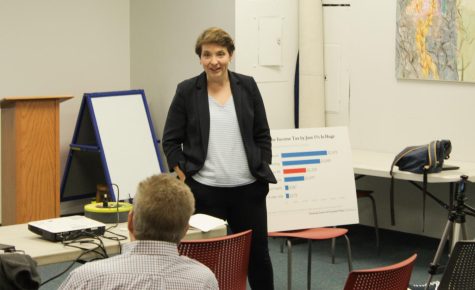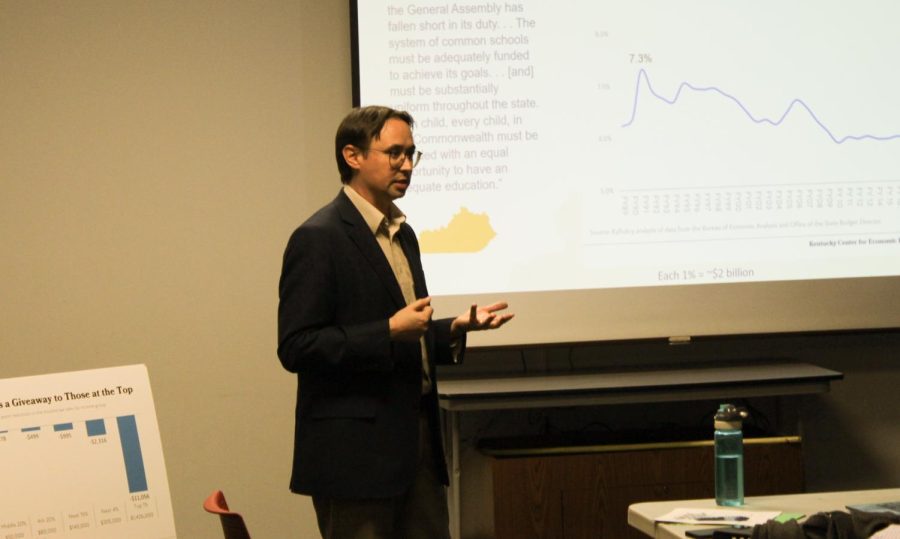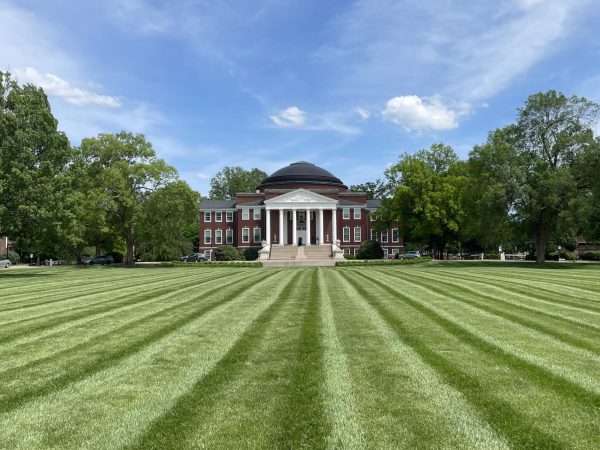This week in Politics: Jan. 8th
Kentucky Center for Economic Policy Executive Director Jason Bailey gave a presentation on HB1 at the Highlands Public Library on Monday. Photo by Brennan Eberwine
January 14, 2023
Although this week has been comparably slow to last week’s whirlwind of swearing-ins, Speakership fights, and unmatched C-SPAN coverage, this week still featured lots of new headlines out of Washington, Frankfort and Louisville.
The House gets down to business; Biden’s files and gas stoves become induction points
After 15 votes in the United States House of Representatives, Republican Representative of California Kevin McCarthy was elected Speaker of the House early Saturday morning. The drawn-out process attracted attention to a usually ceremonious affair before the new Congress was sworn in. McCarthy went through multiple rounds of deals and concessions with the 20 or so far-right lawmakers who were blocking his speakership vote before finally being voted in.
The culmination is a new set of rules in the House of Representatives that makes it easier for the Speaker to be ousted, including a slower process and a lot more committees. Republicans will specifically be creating committees surrounding the United States’ competitiveness with China, enforcing borders and working on investigating the Biden family, which will be headed by Kentucky Republican Rep. James Comer.
Biden’s affairs quickly became a flash-point this week after several classified documents from his time as vice president were discovered. The Presidential Records Act stipulates that any documents created or used during an administration should be turned over to the National Archives. This was an issue last year when former President Donald Trump refused to turn over documents from his administration and instead elected to take them to his private Florida residence Mar-a-Lago. It’s unknown what the contents of the documents were and, unlike Trump, Biden voluntarily returned the documents to the National Archives when they were uncovered. Attorney General Merrick Garland has appointed special counsels to investigate both cases.
What’s up with Kentucky’s taxes?
The Kentucky General Assembly is out of session until February 7th because of the shortened non-budget year calendar; however, legislation still got movement in the first week. Most notably being House Bill (HB) 1, legislation that would cut Kentucky’s income tax rate down to 4%. The ultimate goal being that in the coming years Kentucky will have no income tax at all. Supporters of the measure have pointed to Tennessee as a model for Kentucky’s tax code and hope to spur growth in the Commonwealth.
The bill still needs to make its way through the Senate chamber but passed easily in the House mostly along party lines and is expected to have no trouble in the upper body.
A 0.5% tax cut is projected to cut about $600 million from state revenue each year, a shortfall Republicans try to make up for in the bill by taxing a seemingly random amalgamation of services including personal fitness and summer camps, which is still not enough to make up for the fall in revenue.
Critics of the bill, most notably left-leaning think tank Kentucky Center for Economic Policy (KCEP), say this policy will ultimately cripple social spending such as Support Educational Excellence in Kentucky (SEEK), Kentucky’s program for ensuring equitable funding for school districts, and dry up Kentucky’s rainy day fund.
Those in favor of the bill have touted Kentucky’s $1.4 billion budget surplus in the past year as an example of growth that could be unleashed by lowering the tax rate. However, KCEP pointed to government stimulus and inflation as main factors in that growth, with all 50 states running surpluses in the 2022 fiscal year.
Rep. Josie Raymond (D-Louisville) opposes the bill saying Kentucky needs to do more with its social spending and cutting a tax that puts the most weight on wealthier Kentucky residents is not the answer.

“Our needs are not met in Kentucky. We need school construction, we need teachers, we need healthcare workers, we need caretakers.” Raymond said.
One notable service that will be taxed under this legislation is piercings, hitting alternative teens hard.
“It’s really upsetting because piercings are already way too expensive,” said Ava Dixon (12, YPAS), who has her nose, belly button, eyebrow, and ears (triple) pierced.
Although we’ll have to wait and see if Kentucky will turn into Tennessee through cutting the income tax, it’s clear the Legislature has shifted from a “War on Louisville” to a “War on Alternative teenagers.”
Another death in Louisville Metro, Greenberg asks for community support
A 13th person in a little over a year died while in custody of Louisville Metro Detention Center, highlighting a crisis besieging the city’s jail. The man was identified by activists as Ishmael Worth Puckett; he was 61. Conditions in the jail have worsened in recent months due to staffing shortages and crumbling infrastructure that have made the jail unsafe. Some in the city, including Council President Marcus Wrinkler, have suggested a new facility needs to be built in order for conditions to improve.
Beyond the jail, Louisville Mayor Craig Greenberg called upon community members to help solve what he called a “violent crime emergency” in Louisville. Violence in the city spiked after the pandemic and Greenberg was elected to office on a mandate to “fully fund Louisville Metro Police Department”. Greenberg outlined plans to bolster efforts to stem violent crime in the city involving the community and asked those interested to call (502)574-2003.


















